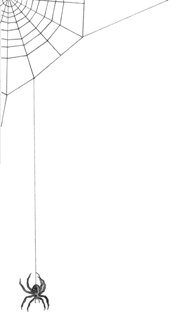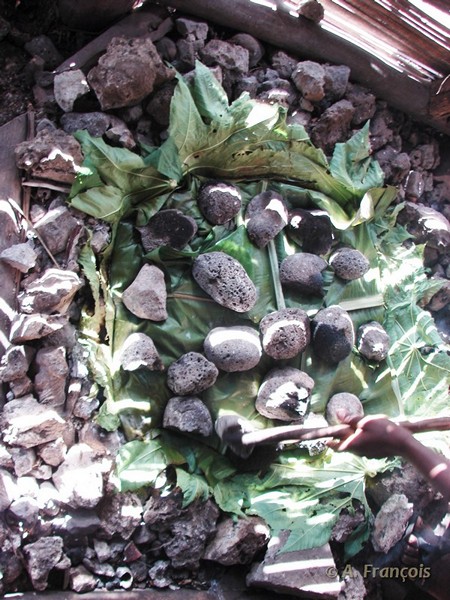pa pa Tense Aspect Mood marker
Grammar
1 – preceded by other clausesSequential aspect: indicates a necessary relationship between two events, either in time or logicalmode de la succession immédiate, de l'implication exclusive entre deux relations prédicatives; valeur d'inceptif
| Nam sovi naivou-ku r̄o vara jo sle mara variri lo hanhan, par̄ahu kam̈a pa v̈a lo maket.I'm waiting for my wife to feed the kids, then we shall go to the market.J'attends que ma femme ait donné à manger aux enfants, ensuite nous irons au marché. |
| Nanovi, nam re na v̈a na r̄ai r̄e viha; mo je r̄e rip̈a, nam pa je v̈a.Yesterday I wanted to go and cut some wood; but I didn't have an axe, so I didn't go.Hier, je voulais aller couper du bois ; mais comme je n'avais pas de hache, je n'y suis pas allé. |
2 – in an independent clausecontrastive focus on time: (V happened) at that specific moment, never before nor after
| Nam pa lesi r̄asi-m keskesi.I am seeing your younger brother for the first time. |
3 – hence+ IrrealisFuture reference, e.g. in a promise or a prediction+ IrrealisFutur, par ex. dans une promesse ou une prédiction
| Nija jo pa han r̄e sa?What are we going to eat?Qu'allons-nous manger ? |
| Na pa lahi pong r̄olu.I will marry in three days' time. |
| Vara mo sivo lo pere vosa, nko ha pa nak-i-ko ha pa hani-ko.If (the reed) falls on to a Terminalia tree, (this is the sign that) they will kill you, they will eat you. |
| Jom̈i-m jo pa te, nko pa r̄aju tilavono.You will lose the joy of living, you will be a wretched man.Tu perdras le plaisir de vivre [ta pensée sera mauvaise], tu seras un homme misérable. |
| Kam̈am povi kam kila r̄o m̈ar̄a in-r̄e-pongi o pa le m̈a Raki.All of us here we hope that one day you will come back to Araki.Nous tous, nous espérons qu'un jour tu reviendras à Araki. |
paliha~ paliha noun, relational
PNCV*bwalikaaffine
pallaje pallaʧe noun
PNCV*laz(e,i)coralPOc*laje
sea coralcorail de mer
| Mo sivo mo nur lo r̄asi, mo sivo mo var̄i-a pallaje.He ran down the slope and dived into the sea, looking for coral.Il dévala la pente et plongea dans la mer, où il alla chercher du corail. |
pana pana
p̈ana
adverb
placed before the sentence focusmaybe, probablypeut-être, sans doute
| R̄aju mo hese mo karumi-a laho vinini, mo re pana jau.Somebody was there, scraping the trunk of the palmtree – no doubt a coconut crab, he thought.Quelqu'un était là, qui grattait le tronc du palmier – sans doute un crabe de cocotier, pensa-t-il. |
| Mo je rongo ha le sivo Raki mo re m̈ar̄a pana ha jolo lo r̄asi.They no longer want to go to Araki because they say they might drown in the sea.Ils ne veulent plus se rendre à Araki car, disent-ils, ils risquent de se noyer en mer. |
seekorongo
pani pani
pan
subordinator
but, however. Usually expresses a logical contrast between two clausesmais; pourtant. Exprime une contradiction entre deux propositions
| Nam varai kam̈im nam re ha v̈a hojo lim̈a-m̈im, pan lim̈a-m̈im mo viriha r̄o.I told you to wash your hands, but they are still black!Je vous avais dit d'aller vous laver les mains, mais elles sont encore noires ! |
| Nam re na var̄i-a suka, pan nam petepete.I would like to take the sugar, but I am too short!Je veux attraper le sucre, mais je ne suis pas assez grand. |
| Jam je levse lesi-a, pani nia mo r̄oho r̄o.We cannot see him, yet he exists.On ne peut pas le voir, mais pourtant il existe. |
paro paɾo adjective
PNCV*bwaro
1 – fruitgreen, unripe; raw, uncookedfruitvert, pas mûr ; cru, pas cuit
| Nam poe nam re na voli r̄e v̈er̄ali paro.I want to buy some green bananas.Je veux acheter des bananes pas mûres. |
antonymm̈ena
par̄ahu parahu adverb
PNCV*takuʀu
after, afterwardsaprès, ensuite
| Nam sovi naivou-ku r̄o vara jo sle mara variri lo hanhan, par̄ahu kam̈a pa v̈a lo maket.I'm waiting for my wife to feed the kids, then [lit. after that] we shall go to the market.J'attends que ma femme ait donné à manger aux enfants, ensuite nous irons au marché. |
synonymm̈ar̄a
par̄u paru noun, relational
PNCV, POc*bwatu
Anatomy
hum, animalhead
| Mo var̄i-a no-no m̈aja, mo vjan-i-a lo par̄u-na.He seized his club, and smashed her head with it.Il saisit sa massue, et lui fracassa la tête avec. |
| Par̄u haur̄a!You stubborn / naughty! [lit. hard head]tête de lard ! |
| p̈is par̄u pothumb [lit. pig's head finger] |
paua paua noun
power, esp. occult or sacred powerpuissance, pouvoir, partic. pouvoir occulte ou sacré
| Kesi jara nosun r̄aju mo r̄oho kia ha, mo r̄e je r̄e no-no paua.Today, people live there, because its power (that of the bewitched tree) has disappeared.Aujourd'hui, il y a des gens qui habitent à cet endroit, car son pouvoir (de l'arbre ensorcelé) a disparu. |
| Paua no-n Ngor mo jeu-a, mo jeu-a paua no-n Setan.The power of God is stronger, stronger than the power of Satan.Le pouvoir de Dieu est plus fort, plus fort que le pouvoir de Satan. |
pavu paβu noun
PNCV*tavoʀaTerminalia
Fish
Flametail snapper, bsl. Jone: reef fish, 48 cmLutjan fauve (angl. Flametail snapper), poisson récifal, 48 cm
pavu ra-tavoa noun
Humpback snapper, bsl. Pinkfis: reef fish, 45 cmLutjan bossu (angl. Hump back snapper), poisson récifal, 45 cmLutjanus gibbus.
pele pele Tense Aspect Mood marker
Grammar
between Subject and Verbtake o.'s turn (in doing s.th.); hence while, whereas(faire qqch) à son tour, en alternance avec qqn d'autre; Cf. tandis que. S'insère entre le pronom sujet et le verbe
| R̄e jo pele sna jo holo aka!Let someone come and (take my place to) man the boat!Que quelqu'un vienne diriger le navire (à son tour) ! |
| Ale o sna, o pele o le var̄i-a jara-m, na na si na pele hanhan.Okay, come; while you come back to your place, I will go and have lunch.Allez, viens: tandis que toi tu reprends ton poste, moi je descends manger. |
pere peɾe noun, relational
tree, mountaintop, summitcime, sommet (arbre, montagne)
| lo pere vosaat the top of a Terminaliaau sommet d'un Terminalia |
peresi~ peɾesi
p̈eresi~
preposition, verb-like
with, together with ‹s.o., s.b.›; marks accompaniment rather than instrument
| Nam re na v̈alum p̈eresi-ko.I'm going to fight with you.Je veux me battre avec toi. |
| Mo m̈ar̄e, huri-na prongo peresi-a sui-na.He was dead, having nothing more than his skin on [lit. with] his bones.Il était mort, et n'avait plus que la peau sur les os. |
pereti peɾeti noun
bread, of European origin, but now produced locally
| Kesi hanhan vutiana: pereti; raisi; hina vutiana, pan r̄uai mo je r̄e hanhan.Nowadays, there is plenty of (different sorts of) food: bread, rice, many things; but in olden times, there was no food (like that). |
peropero peɾopeɾo verb, intransitive
PNCV*bweroear
deaf
| Poro-no mo te, nia mo peropero.He has bad ears, he is deaf.Ses oreilles sont défaillantes, il est sourd. |
per̄a pera noun
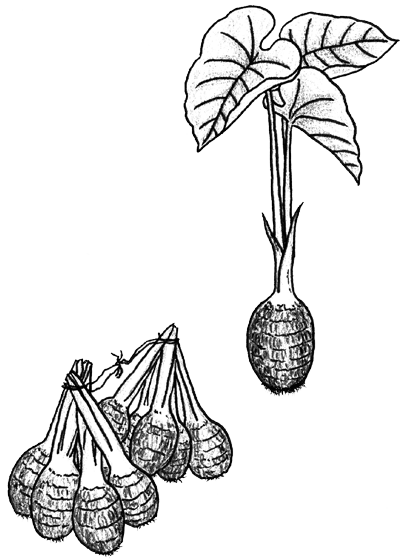
PNCV*bweta
| ra-per̄ataro leaffeuille de taro |
| juli per̄ataro shootplant de taro |
| Naprongo vara jo usa, pla-m per̄a jo je levse m̈au.Even if it rains, your taro won't be able to grow properly.Même s'il pleuvait, ton taro ne pourrait pas se développer. (car tu l'as mal planté...) |
per̄a tasale noun
white man's taroFiji taro, Hongkong tarotaro des Blancstaro Fiji ou taro des HébridesXanthosoma sagittifolium.
petepete petepete adjective
2 – humsmall, not tallhumpetit, en parlant de la taille d'une personne
| Nam re na var̄i-a suka, pan nam petepete.I want to reach the sugar, but I'm not tall enough.Je veux attraper le sucre, mais je ne suis pas assez grand. |
3 – figbreathshort, breathless, such as in suffocationfigsoufflecourt, réduit, dans le cas de l'essoufflement ou de l'asphyxie.
| Siho mo m̈alokoloko, m̈apu-na mo petepete mo jovi mo m̈ar̄e.The Kingfisher was so exhausted, breathless [his breath was so short], that he collapsed and died.Le martin-pêcheur était exténué, complètement suffoqué [son souffle était court], si bien qu'il s'effondra et mourut. |
plane plane
plan
verb, transitive
trplani-
throw, cast
| Mo var̄i-a sule mo sa kia mo plan-i-a lo jara ri.Each one brings a stone up there, and throws it from that place.Il prend une pierre, monte là-haut, puis le lance du haut de cet endroit. |
| Mo var̄i-a ra-holo mo plan-i-a kaur̄a hinia.They take coconut palms and throw them over (the breadfruit being stored).(après avoir déposé le fruit-à-pain) on prend des palmes de cocotiers et on les jette dessus. |
| Na pa sa na pa r̄an-i-a na pa plan-i-a sna.I will climb up, catch it (a coconut crab) and throw it to you. Je vais monter l'attraper (le crabe), et puis je te le lancerai. |
po po noun

PNCV*boe
Fauna
pig
| pula-ku pomy pig (I breed)mon cochon (que j'élève) |
| ha-ku pomy piece of pork (to eat)mon porc (que je mange) |
seerave
poe poe
opoe
verb, transitive
Seeobo-i-alove him
tr|fs{(}o|fs{)}poi-|fs{(}o|fs{)}poei-
1 – appreciate ‹s.th.›; like, desire ‹s.o.›apprécier (qqch); aimer, désirer (qqn)
| Nam po-i Raki vutiana.I like Araki (island) very much.J'aime beaucoup (l'île) Araki. |
| Nam poe-i-a no-m soro.I like your language.J'aime bien ta langue. |
| Om re se mo po-i-ko?Who do you think loves you?De qui crois-tu être aimé ? |
2 – + verb V2; or (+ vara or mo re) + Irrealisdesire, wantdésirer, vouloir (que, vara ou mo re + Irrealis)
| Ta, nam po-i-a vara o r̄ai r̄e aka-ku.Father, I want you to carve me a canoe.Père, je voudrais que tu me tailles une pirogue. |
| Om poe levse vara m̈auri-m jo pa iso lo sava jara?Do you want to know in what kind of place you will end your life? |
polo2 polo noun
Fish
Pencil-streaked rabbitfish, bsl. Yelotel-piko: reef fish, 30 cmPicot cerclé (angl. Pencil-streaked rabbitfish), poisson récifal, 30 cmSiganus doliatus.
pono pono noun
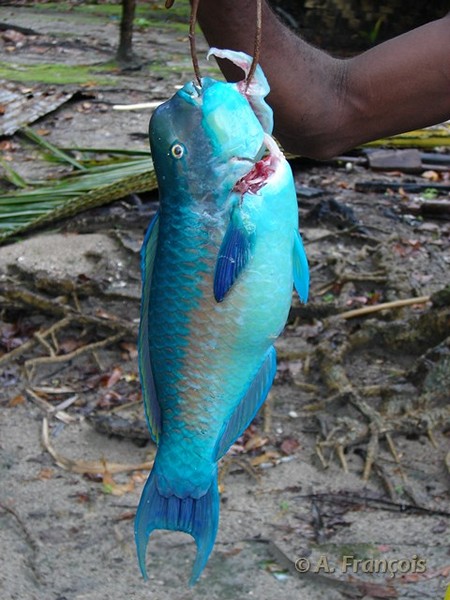
Fish
Quoy's parrotfish, bsl. Blufis: reef fish, 40 cmPerroquet de Bloch (angl. Quoy's parrotfish), poisson récifal, 40 cmScarus blochi.
pongi poŋi
pong
noun
PNCV, POc*boŋi
1 – raredayrarejour
| Kam̈am povi kam kila r̄o m̈ar̄a in-r̄e-pongi o pa le m̈a Raki.All of us here we hope that one day you will come back to Araki.Nous tous, nous espérons qu'un jour tu reviendras à Araki. |
synonymrani
2 – forme circonstants référant à un nombre de jours dans l'avenir: 'dans (x) jours'+ numberforms adverbial phrases referring to a number of days in the future: 'in (x) days' time'
| pong ruain two days' time, the day after tomorrow |
| pong haualuin eight days' time |
| Na pa lahi pong r̄olu.I will marry in three days' time. |
poro poɾo noun, relational
PNCV*bwero
Anatomy
earoreille
| poro m̈arau-kumy left ear |
| Poro-no mo te, nia mo peropero.He has bad ears, he is deaf.Ses oreilles sont défaillantes, il est sourd. |
posi1 posi
pos
Averb, intransitive
1 – in navigatingtack, turn, change directionvirer, changer de direction
| Mo le v̈a v̈a sur̄i-a jingo hosun mo sivo mo pos mo v̈a lej.Again he sailed alongside the cape; after a while, he started tacking, and disappeared from the horizon.À nouveau, il se mit à longer le cap; au bout d'une certaine distance, il se mit à virer de bord, et disparut à l'horizon. |
Bverb, transitive
modify, change ‹s.o., s.th.›modifier, changer
| Mo levse posi-a naho rai p̈ir̄a sohe nosun om po-i-a r̄o.(This devil) knows how to transform women's faces into the one you love (in order to attract you). |
| Nam lesi-a p̈ilo-m mo posi-a m̈ajihi-na mo viriha mo lulu.I was looking at your bald head, changing its colour from black to white.Je voyais ton crâne changer de couleur, tantôt foncé tantôt clair. |
posi2 posi noun, relational
fashion, style, typical manner of (s.o.); way, naturestyle, manière typique de (qqn); caractère, nature
| Pan nira mo r̄e levsei-a mo re kesi posi-n Spoemalao kesi mo v̈ei-a kesi.But they realised that it was just like Spoemalao [it was his style] to have done such a thing.Mais ils reconnurent là que c'était bien le style de Spoemalao d'avoir agi ainsi. |
povi poβi
Aadjective
affecting the subjectall, everybody
| Kam̈im po ha ngingisa!All of you, please smile!Vous tous, faites un grand sourire ! |
| M̈aji mo avuavu nra povi.The birds all took flight.Les oiseaux prirent tous leur envol. |
Bpostverb
affecting the object(do V) totally, completely(faire V) entièrement, complètement
| Mo v̈ei povi-a rai hina hosun.He did all those things entirely.Il fit entièrement toutes ces choses. |
| Mo han-i-a mo han povi-a.He ate it, he ate it all up.Il le mangea, il le mangea entièrement. |
SyntaxeAprès un verbe, c'est povi qui prend les marques de transitivité.
Synt.After a verb, the transitivity markers are transferred from the verb to povi.
prongo pɾoŋo adverb
pua pua
puá
noun
| Na v̈a na hanhan lo peli-n puá.I'm going to have lunch at my mum's.Je vais manger chez ma mère. |
| Na ul r̄e leta jo sivo sa-n pua.I must write a letter to [lit. which should go to] my mother. |
pula~ pula
pla~
possessive classifier
Grammar
Possessive classifier referring to economical possessions, esp. plants and possessed animalsClassificateur Possessif renvoyant à des possessions de valeur, dans le cadre de l'élevage et de l'agriculture
| pula-ku holomy coconut tree (I planted)mon cocotier (que j'ai planté) |
| pula-ku pomy pig (which I feed)mon porc (que je nourris) |
| Nam v̈ahani-a pla-ku to.I am feeding my fowls.Je nourris mes poules. |
pultan pultan postverb
together, in the same place
| Ha huren pultan-i-a par̄um̈im!Put all your heads together!Placez tous vos têtes au même endroit ! |
pur̄o puro noun, relational
PNCV*butoPOc*butoŋ
Anatomy
navel; umbilical cordnombril ; cordon ombilical
| Dokta mo je m̈isi r̄ai-a pur̄o-no.The doctor hasn't yet cut his cord.Le médecin ne lui a pas encore coupé le cordon. |
p̈ahaso t̼ahaso noun, relational
Anatomy
biceps
| O v̈ei-a sohe-na p̈ahaso-m jo sosohoni.Show off your biceps!Fais saillir tes biceps ! |
p̈aheu t̼aheu
p̈ahe
noun
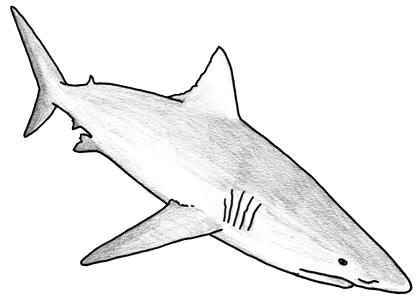
PNCV*bakewa
Fish
sharkrequin
| P̈ahe mo har̄i-a sari-ku!My leg got bitten by a shark!Je me suis fait mordre la jambe par un requin ! |
| Hariv mo karu karu karu karu karu, mo lesi-a p̈ahe.And the Rat swam, swam, swam, swam… until he saw a shark. |
p̈aisa t̼aisa
paisa
noun, relational
p̈aka t̼aka noun, relational
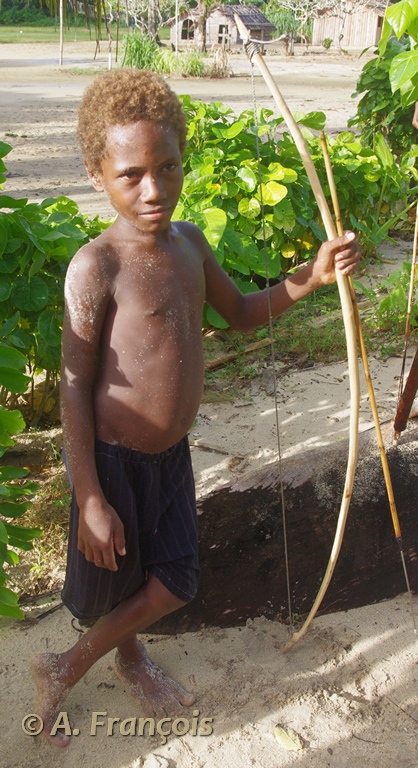
a bow, to shoot witharc, arme utilisée au combat ou à la chasse, pour tirer
| P̈aka nene, m̈ar̄a vinavina.This bow is made for shooting arrows.Cet arc est fait pour (tirer avec) des flèches. |
| No-ku ta, o voro r̄e p̈aka-ku, r̄e vina-ku.Father, make me a bow and some arrows.Mon père, fabriquez-moi un arc et des flèches. |
p̈ap̈a t̼at̼a noun
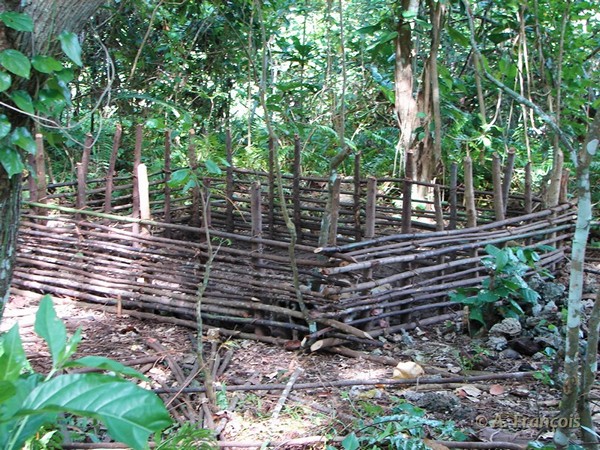
fence, esp. surrounding a garden (isa)clôture, enclos, spéc. disposé autour d'un jardin
p̈ar̄i t̼ari noun, relational
PNCV*bati(upper canine) tooth
Anatomy
molar tooth (vs. naho hojo 'front teeth')
p̈ep̈e t̼et̼e noun
PNCV, POc*bebe
Fish
2 – Lined butterflyfish, reef fish, 35 cmChaetodon linéolé (angl. Lined butterflyfish), poisson récifal, 35 cmChaetodon lineatus.
p̈eravu t̼eɾaβu adjective
PNCV*baravulong, tall
1 – long, stretched out horizontally; e.g. a cape (jingo) stretching far out to sealong, étiré horizontalement ; ex. en parlant d'un cap (jingo) très avancé en mer
| Mo v̈a lo r̄av̈al jingo v̈a-su jingo p̈eravu.He reached beyond the cape over there, that headland stretching out to sea.Il finit par dépasser le cap là-bas, ce promontoire avancé. |
2 – hum+tall, vertically longgrand, long verticalement : partic. en parlant de la taille d'une personne
antonympetepete
p̈ilahe t̼ilahe
p̈ilahe hurar̄a
noun
PNCV*bilakeBuff-banded Rail
Birds
Buff-banded Rail, a long-legged bird, 30 cmRâle à Bandes, oiseau aux longues pattes, 30 cmGallirallus philippensis.
p̈ilahe r̄asi t̼ilahe rasi noun
Birds
seashore Raila bird
1 – Asiatic Whimbrel, a bird with downcurved beak, 45 cmRâle du bord de merCourlis courlieu, oiseau au long bec pointu et recourbé, 45 cmNumenius phaeopus.
p̈ilai t̼ilai postverb
(kill) in one blow, outright(tuer) d'un coup, violemment
| Mo nak p̈ilai va p̈ir̄a honi mo si mo jolo.He killed the young woman outright, and she sank (to the bottom of the water).Il tua d'un coup la jeune femme, qui coula à pic (au fond de l'eau). |
p̈ili pili noun, relational
Anatomy
shoulderépaule
| Huir̄a mo re "Ale, o sna sarai lo p̈ili-ku!""Okay", said the octopus, "come and sit on my shoulders.""D'accord", dit le poulpe, "viens donc t'asseoir sur mes épaules." |
p̈ilo pilo noun, relational
Anatomy
bald headcrâne dégarni, calvitie
| Nam lesi-a p̈ilo-m mo posi-a m̈ajihi-na mo viriha mo lulu.I was looking at your bald head, changing its colour from black to white.Je vois ton crâne qui change de couleur, tantôt sombre et tantôt clair. |
p̈iri t̼iɾi noun, relational
PNCV*biriseed
plantseed; [fruit] stonegraine, semence; pépin, noyau
| Mo vahuren-i-a kavula-na, vahuren-i-a p̈iri-na...They take away the pith, take away the seeds... |
p̈ir̄a t̼ira noun
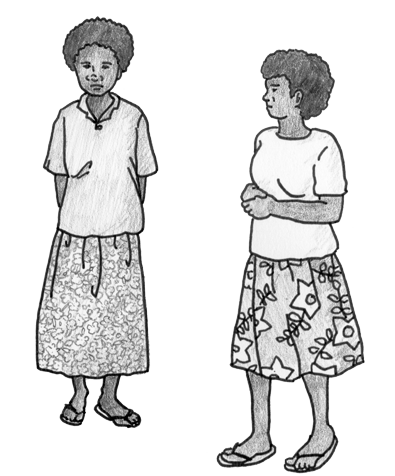
female, woman (vs. lam̈ani ~ r̄aju "male, man"); [+Poss. Class. no~] wife
| R̄aju vo p̈ir̄a?(Is it) a man or a woman? |
| P̈ir̄a uluvo hosun mo r̄oho r̄o r̄av̈al jingo.This young woman was living on the other side of the cape.Cette jeune femme habitait de l'autre côté du cap. |
| Mo levse posi-a naho rai p̈ir̄a sohe nosun om po-i-a r̄o.(This devil) knows how to transform women's faces into the one you love (in order to attract you). |
p̈isu t̼isu
PNCV*bisufinger, toe, nail
Anoun, relational
Anatomy
finger; [bird] clawdoigt ; [oiseau] serre
| P̈isu-ku koru lo hapu.I burnt my fingers in the fire.Je me suis brûlé les doigts sur le feu. |
| M̈ala mo var̄i-a p̈isu-na mo huren-i-a mo sivo lo hap̈asi via, mo majuru.With its huge claws, the hawk seized the taro stem, and tore it to pieces.De ses grandes serres, le faucon saisit la tige de taro, et la déchira complètement. |
Bverb, transitive
trp̈isui-
1 – indicate, designate; point atindiquer, désigner, pointer du doigt sur
| Nam p̈isui R̄ango.I'm pointing at Tangoa.Je désigne Tangoa. |
2 – touch ‹s.th.› with a finger or a similar object [knife +], with the intention of pricking or making a holetoucher (qqch) avec le doigt ou un objet similaire [couteau +], afin d'appuyer ou de faire un trou
| Here na pa p̈isu jurung-i-a aka-ja!With my claws, I'm going to make a hole in this canoe! [lit. I will prick-perforate][le faucon] Avec mes serres, je vais faire un trou dans cette pirogue ! [litt. je vais appuyer-perforer] |
